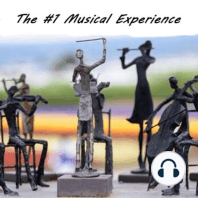UNLIMITED
Sebastian Bach Harpsichord Concerto no. 1 in D minor, BWV 1052 - Complete Performance: Why We Should Expose Our Kids To Classical Music https://ourtownlive.net.Sebastian Bach Harpsichord Concerto no. 1 in D minorThis work, scored for harpsichord, two violins, viola and continuo section, and clocking in 22 minutes, is tought to be... by The #1 Musical Experience
UNLIMITED
The Well Tempered Clavier, Book I, BWV 846-869 - Prelude in Fugue No.1 in C major
UNLIMITED
The Well Tempered Clavier, Book I, BWV 846-869 - Prelude in Fugue No.1 in C major
ratings:
Length:
4 minutes
Released:
Mar 10, 2021
Format:
Podcast episode
Description
Why We Should Expose Our Kids To Classical Music https://ourtownlive.net #herbw79Bach begins his epic journey through all the keys in C major for the first Prelude and Fugue. He then moves to C minor for the second then chromatically upwards to C sharp major for the fourth and C sharp minor for the fifth and so on. The importance of these works cannot be overstated. They not only offer every aspiring pianist the opportunity to immerse themselves in the world and style of Bach but also to develop their polyphonic technique in playing fugues of three and four voices. One key consideration Tovey makes in his editorial notes to the ABRSM collection is that “Bach writes very accurately what is to be played but, he leaves the performer free as to how it is played.” Taking the time to understand the time in which these works were composed is also crucial regarding any decision in how they are played. Ensuring the clarity of Bach’s part-writing is paramount as is being able to mark the climatic moments in each piece. Bach could not have known how the piano of today would sound and this needs thought when approaching these works.There are many subtle differences in how these pieces would sound between these instruments, but what can be agreed is the ingenuity and skill with which Bach composed these works regardless of the instrument on which they are performed. In a way, it is all the more remarkable, as the compositions are perfectly convincing on modern instruments and do not detract from the genius of the work. Get bonus content on Patreon Hosted on Acast. See acast.com/privacy for more information.
Released:
Mar 10, 2021
Format:
Podcast episode
Titles in the series (100)
- 23 min listen